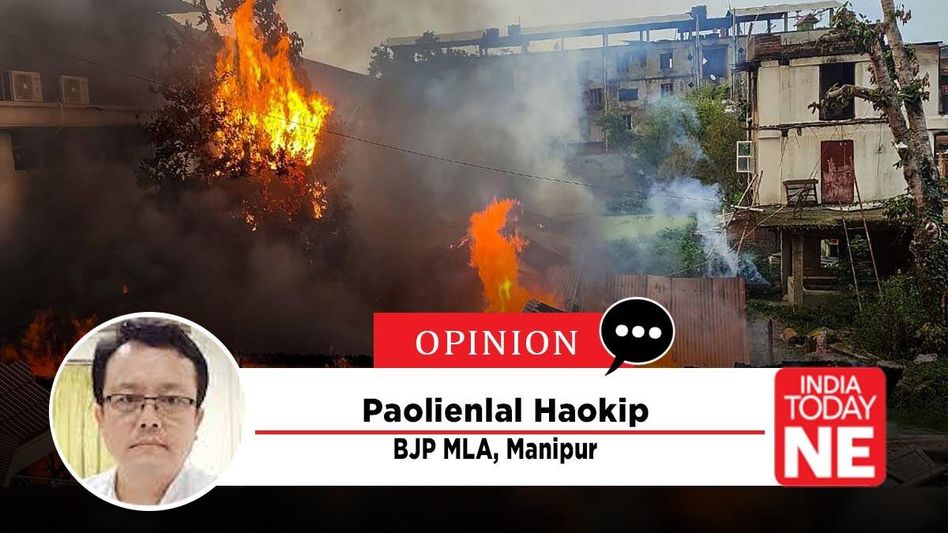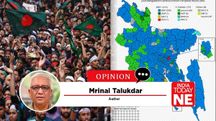Manipur violence could not be contained because of complicity of Biren Singh government
Proof of state complicity can clearly be discerned from the fact that what started out as a purely ethnic-communal violence was later on attempted to be portrayed by the Chief Minister as the state’s war on ‘narco terrorists’. The narrative seemed to be aimed at justifying the use of state forces to aid the radicalised Meitei militia in attacking and burning down Kuki Zo settlements in the foothills surrounding the Imphal valley, beyond which it doesn’t seem to hold much water.
 Manipur violence could not be contained because of complicity of Biren Singh government
Manipur violence could not be contained because of complicity of Biren Singh government The avoidable ethnic violence witnessed since May 3, unlike other violent riots at different times in various parts of India, took time to be contained due to certain factors that are unique itself. The first and most important reason why the violence took time to be contained is the complicity of the state in the violence. Proof of state complicity can clearly be discerned from the fact that what started out as a purely ethnic-communal violence was later on attempted to be portrayed by the Chief Minister as the state’s war on ‘narco terrorists’. The narrative seemed to be aimed at justifying the use of state forces to aid the radicalised Meitei militia in attacking and burning down Kuki Zo settlements in the foothills surrounding the Imphal valley, beyond which it doesn’t seem to hold much water.
The second reason for the prolonged violence could be the longstanding conflict over rights under the constitution which had been simmering since the pre statehood days. It is a fact that most of the resources allocations to the state had always been appropriated by the valley Meitei community by din of their control over the legislature, the executive and judiciary. Such an unfair appropriation of resources is ensured by rendering check mechanisms dysfunctional. The Hill Areas Committee of the Legislative Assembly, for example had been stifled and denied its constitutional functions and powers. The delimitation commission report has been stalled because it recommends giving more seats to the tribals in proportion to their increased percentage of population in the state. Tribal lands were constituted as reserved forests and protected forests without following the norms that require the tribals to claim pre existing rights, if any. Reservations in state government recruitments had been ‘managed’ to curtail due representation of schedule tribes in government jobs. Corruption has been at levels most tribals cannot cope up with, further limiting their access to opportunities. Therefore, the ethnic violence in a way is perceived as war of liberation from such gross injustices by the tribal Kuki Zo people, while the Meitei militia see it as a war to claim tribal land. The intent of both communities are different as Kuki Zo community desired constitutional order whereas the Meitei intent is a challenge on the constitutional rights of tribal Kuki Zo community.
The violent conflict is avoidable had provisions of the constitution been properly observed in the administration and governance of the state without any bias and had the state been neutral, as it should be, between communities. A biased government anywhere is detrimental to peace, and although such bias was always present in some degree in Manipur, it accentuated under the current Chief Minister, who is known to be hand in glove with radical groups like Meitei Leepun and Arambai Tenggol, the main executors of the ethnic cleansing of Kuki Zo community. However long a marriage might have lasted, when it fails, there’s no point trying to remain in such a marriage. Likewise, when differences have run so deep, the road ahead needs to be carved respecting the differences. The Union government must ensure that all sections of citizens including the Kuki Zo community enjoy the privilege to be happily Indian, and not be prisoners of their neighbouring community’s pride and greed.
The immediate task ahead is to recover the huge cache of arms seized from state armouries, both in the valley and hills. For this, the Armed Forces (Special Powers) Act 1958, a much vilified law, needs to be reimposed in the Manipur Valley, for a definite period with definite purpose. Central armed forces need to pace up creating effective buffer zones along ethnic boundaries. Once the violence, which continues due to continued attacks on Kuki Zo villages, is brought under control, deliberations should be expedited for a political settlement that ensures the non recurrence of such costly conflict. Costly not only in economic terms of hindering development, but also in terms of smearing the good image of the country internationally, and inviting avoidable resolutions against India by European Parliament et al.
Copyright©2026 Living Media India Limited. For reprint rights: Syndications Today









